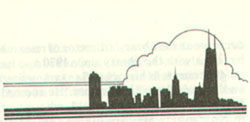

By CHARLES B. CLEVELAND
Chicago
Judge Power loses retention, but it wasn't the first time Daley lost a judge
MOST STUDENTS of Mayor Richard J. Daley's career know that the Chicago Democrat has been virtually unbeatable in most of his career. The best known exception was 1946 when he ran, and lost, for sheriff; some feel that event actually advanced his career because the sheriffs office had long had a reputation as a political graveyard.
But there was a second election loss that is almost buried in political limbo — November 3, 1953. It was the very first election held under Daley's leadership. This was before he was elected mayor in the spring of 1955 and even before he was an announced candidate. But it was his first political test as chairman of the Cook County Democratic party.
The search into earlier Chicago history was prompted by the results of the November election in which one of Mayor Daley's closest political allies, Joseph Power, was defeated for the second time. The first time he lost the Democratic nomination as a Supreme Court justice in the March 1976 primary; the second time he became one of the few judges to fail to win retention. He was circuit judge.
Under the retention system, a judge must get a 60 per cent approval to remain on the bench. Chicago newspapers, Chicago Bar Association, Council of Lawyers and others had recommended to voters that they reject Power and Chester Strzalka, Edith Sampson and Paul F. Elward on a variety of complaints which they said made the four unsuited to remain on the bench.
However, only Power was defeated, primarily because of negative votes cast in suburban Cook County. Why Power and not the other three? His close ties with Mayor Daley probably hurt among Republicans and Independent Democrats. He probably also paid a penalty for being well known over the years.
The combination gave Power a reputation of being a political judge, a not unusual thing in Chicago where most judges get on the bench as a direct result of political service; but this time the label seemed to surface, as it does from time to time, to lead a voter rebellion. (Power received a 58.84 per cent "yes" vote on retention, when 60 per cent was needed.)
Much of the criticism of Power resulted from his conduct during the special grand jury investigation of the role played by Edward V. Hanrahan— at the time state's attorney and then one of Daley's favorites — in the pre-dawn raid in 1969 in which two Black Panther Party members were shot to death. (The case is still not concluded; a federal case was still being heard by Judge Joseph Sam Perry in late 1976.) Power appointed Barnabas Sears, a leading Chicago lawyer, as a special prosecutor in the case, but then made a number of rulings as chief judge of the criminal court which seemed designed to hamper Sears and prevent the indictment of Hanrahan. At one point Power fined Sears $50 an hour for refusing to call witnesses Power wanted to call before the grand jury; Power later tried to suppress the indictment of Hanrahan.
Contempt charges against Sears were dismissed; Hanrahan was acquitted but later defeated for reelection as state's attorney and still later lost his bid for Congress.
Power admits there was animosity between Sears and himself and contends four grand jurors came to him to complain about Sears' tactics in trying to dominate the grand jury. Power also complains that the media treated him unfairly. He received no attention for his role in sponsoring a major change in state law which extended the right of expungement of arrest records to felony charges.
Judge Power did receive financial balm, if not reelection. He was offered a $44,000 a year job as attorney for the Chicago Board of Elections but took instead a similar post with the Chicago Park District paying $32,052 a year. The judgeship was full time, but the park attorney is free to do outside legal work. His judicial pension for 22 years on the bench is $36,000 a year. So he winds up money ahead, since his judicial salary was $42,500 a year.
Just why voters singled out Power isn't as clear as the voter mood in November 1953. At that time there hadn't been a major contest in 32 years; Democrats were in virtual control of Cook County and it was simply an election of judges.
Republican strategist Ralph Berkowitz, who became first assistant to Cook County State's Attorney Bernard Carey, found a vote-stimulating concept: judicial reform. It happened that Democrats in the General Assembly had earlier that year defeated measures aimed at improving the courts. Democrats had also attempted to cinch the election by naming a coalition of prominent Republicans to their Democratic slate. It had been an accepted practice before 1953 and many times since, but this one time it backfired. Further, Chicago's city council was then under much criticism and three city aldermen were running for judge on the Democratic ticket. There were also two Republican aldermen running. None of the aldermen won.
When election day came, instead of the routine turnout, more than a million persons went to the polls; and of 14 contests, Republicans won eight, including the election of a woman, B.Fain Tucker. And, in the process, gave Dick Daley one of his few major political losses. Ź
30 / February 1977 / Illinois Issues